Knowledge
The Liberal Institute presents and recommends a selection of major classical and contemporary works, many of the liberal intellectual tradition can be attributed. All books ordered through this site with our partner Amazon, contribute to the financing of the Liberal Institute.
We wish you a pleasant and enjoyable reading.
Economics
The tragedy of the Euro: A system is destroying itself
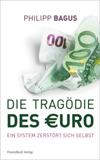 THE END OF THE EURO? € The project is nearing failure.Philipp Bagus, a professor of economics and expert on money and economic theory shows that this development is almost a logical consequence of the intrigue-rich origin of the euro, created his self-destructive political system and individual interests. So for example, was a founding member of a priority for French political class to get rid of the DM and the "tyranny of the German Bundesbank." Individual governments can also make use of the relatively uncontrolled central banking system to finance their deficits. The whole thing looks like a printing press, from which various owners stock up as needed. The consequences are the debt crisis, monetary redistribution and the dangers of a transfer union - not least at the expense of the Germans. The common currency is thus itself to the conflict and potential destroyer producer in Europe. The author shows conclusively that remain alternatives and ways out of the euro countries yet.
THE END OF THE EURO? € The project is nearing failure.Philipp Bagus, a professor of economics and expert on money and economic theory shows that this development is almost a logical consequence of the intrigue-rich origin of the euro, created his self-destructive political system and individual interests. So for example, was a founding member of a priority for French political class to get rid of the DM and the "tyranny of the German Bundesbank." Individual governments can also make use of the relatively uncontrolled central banking system to finance their deficits. The whole thing looks like a printing press, from which various owners stock up as needed. The consequences are the debt crisis, monetary redistribution and the dangers of a transfer union - not least at the expense of the Germans. The common currency is thus itself to the conflict and potential destroyer producer in Europe. The author shows conclusively that remain alternatives and ways out of the euro countries yet.Economy really understand: Introduction to the Austrian school of economics
 May be if there is anything good to crises, at least, that ONE • · posthumous think about whether and how the disaster would have prevented. The recent economic crisis was at least anticipated, and very precise. Vollbracht has no known prophet like George Soros, but a small circle of academic economists in the U.S. people. This recall since the seventies, back for good reasons on the so-called Austrian or Viennese school.In his seminal work shows the economic philosopher Taghizadegan Rahim, the factors for continued research in the tradition of Carl Menger, Eugen von Böhm-Bawerk, Ludwig van Mises and Friedrich August von Hayek speak.The benefits of science, the reliable future forecasts and warnings for the company supplies can not be overstated. Hence the plea for a reorientation of the author or return to the thinking of the Vienna School is more than understandable.As understandable as his pioneering work.
May be if there is anything good to crises, at least, that ONE • · posthumous think about whether and how the disaster would have prevented. The recent economic crisis was at least anticipated, and very precise. Vollbracht has no known prophet like George Soros, but a small circle of academic economists in the U.S. people. This recall since the seventies, back for good reasons on the so-called Austrian or Viennese school.In his seminal work shows the economic philosopher Taghizadegan Rahim, the factors for continued research in the tradition of Carl Menger, Eugen von Böhm-Bawerk, Ludwig van Mises and Friedrich August von Hayek speak.The benefits of science, the reliable future forecasts and warnings for the company supplies can not be overstated. Hence the plea for a reorientation of the author or return to the thinking of the Vienna School is more than understandable.As understandable as his pioneering work.The €-plight: Essays on sovereign debt crisis
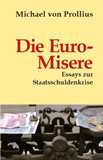 The goals associated with the € have been shown to be illusory. Meanwhile, many were aware that even if the euro is an illusion itself. The ruling government monetary system can not economically, legally, socially or morally justify much less credible. The essays of the money from expert Michael Prollius deal with the fundamental questions concerning our money and offer an alternative view on how it works and thus to the financial and economic crisis. Last but not least, the author develops a way out of the misuse of money by governments.
The goals associated with the € have been shown to be illusory. Meanwhile, many were aware that even if the euro is an illusion itself. The ruling government monetary system can not economically, legally, socially or morally justify much less credible. The essays of the money from expert Michael Prollius deal with the fundamental questions concerning our money and offer an alternative view on how it works and thus to the financial and economic crisis. Last but not least, the author develops a way out of the misuse of money by governments.Freedom or slavery?
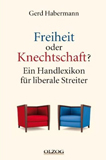 The friends of liberty are on the defensive. Statism, collectivism, egalitarianism and fiscal policy from all sides threaten private property and freedom of space, this increase in the number of policies caused the national debt and a € crisis that is gaining daily in the face of the wrong kind of drama of their fight. The coming years will be the old question of freedom or slavery? put in an elementary way again. This handheld dictionary is to give the many disoriented under the Liberals the spiritual weapons that encourage and empower them to take up the struggle for interpretive theory of liberalism. It focuses particularly on the conceptual confusions and nebulized euphemisms that make it difficult to recognize what it is in the heart of the matter.
The friends of liberty are on the defensive. Statism, collectivism, egalitarianism and fiscal policy from all sides threaten private property and freedom of space, this increase in the number of policies caused the national debt and a € crisis that is gaining daily in the face of the wrong kind of drama of their fight. The coming years will be the old question of freedom or slavery? put in an elementary way again. This handheld dictionary is to give the many disoriented under the Liberals the spiritual weapons that encourage and empower them to take up the struggle for interpretive theory of liberalism. It focuses particularly on the conceptual confusions and nebulized euphemisms that make it difficult to recognize what it is in the heart of the matter.Swiss liberalism on the track / Sur les traces du suisse liberalisme
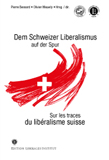 Liberalism is in danger today? An unprecedented global financial crisis has called into action interventions that threaten once again the balance between freedom and the state to shake. Here again, Switzerland is an exception since, but they can escape the pressure from the outside?Renowned authors illuminate the basis of the Swiss success story in the philosophy of freedom and its implications for the future. From the Enlightenment to the great thinkers of the 20th Century, from fundamental questions about current challenges, opening up insights of lasting relevance.Historical, philosophical and economic perspectives that trigger at the right time to reflect on the tension between liberalism and the central concept of the state.Est-il le liberalisme aujourd'hui en danger? Une crise financière mondiale sans précédent of a conduit à une fois bouleversé semblent interventions qui en plus l'État et liberté équilibre entre. La Suisse à fait nouveau figure d'exception, mais peut-elle se Derobe à la pression de l'extérieur? Authors of renown font rediscover la signification de la Philosophie de la liberté de la Suisse dans le succès pour l'avenir et ses implications. Of Lights aux grands du XX e siècle Penseur, the questions fondamentales aux defis Actuel, il en un tableau d'une departmental envergure unique. Historiques of perspectives, philosophiques économiques et qui lancent à temps une reflexion sur le rapport entre le et le liberalisme concept, central, de l'Etat.
Liberalism is in danger today? An unprecedented global financial crisis has called into action interventions that threaten once again the balance between freedom and the state to shake. Here again, Switzerland is an exception since, but they can escape the pressure from the outside?Renowned authors illuminate the basis of the Swiss success story in the philosophy of freedom and its implications for the future. From the Enlightenment to the great thinkers of the 20th Century, from fundamental questions about current challenges, opening up insights of lasting relevance.Historical, philosophical and economic perspectives that trigger at the right time to reflect on the tension between liberalism and the central concept of the state.Est-il le liberalisme aujourd'hui en danger? Une crise financière mondiale sans précédent of a conduit à une fois bouleversé semblent interventions qui en plus l'État et liberté équilibre entre. La Suisse à fait nouveau figure d'exception, mais peut-elle se Derobe à la pression de l'extérieur? Authors of renown font rediscover la signification de la Philosophie de la liberté de la Suisse dans le succès pour l'avenir et ses implications. Of Lights aux grands du XX e siècle Penseur, the questions fondamentales aux defis Actuel, il en un tableau d'une departmental envergure unique. Historiques of perspectives, philosophiques économiques et qui lancent à temps une reflexion sur le rapport entre le et le liberalisme concept, central, de l'Etat.Money, Bank Credit and Economic Cycles
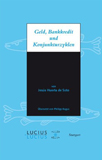 In the present work, the author critically analyzes the economic and legal foundations of our current banking and credit system. This is a high degree of state intervention and regulation own. Thus, the financial system has become the Achilles heel of modern economies.
In the present work, the author critically analyzes the economic and legal foundations of our current banking and credit system. This is a high degree of state intervention and regulation own. Thus, the financial system has become the Achilles heel of modern economies.The optimum currency for Europe? Blessing and curse of €
 The controversial discussion about the debt crisis of the euro countries and the functioning of the European Monetary Union continues. Thus, in Article 125 of the Treaty on the Functioning of the EU clearly states that no member country and not a Community institution for the debts of another Member State is liable and does not occur for such liabilities. But by the agreements reached in the spring of 2010, these non-assistance clause was passed. In the worst case, the European Monetary Union could in the future to the detriment of a transfer union of degenerate financially stronger countries. Explain in this book, Charles B. Blankart, Timothy Congdon, Pascal Salin and Jürgen Stark, the pros and cons of the European single currency and to suggest policy measures and reforms.
The controversial discussion about the debt crisis of the euro countries and the functioning of the European Monetary Union continues. Thus, in Article 125 of the Treaty on the Functioning of the EU clearly states that no member country and not a Community institution for the debts of another Member State is liable and does not occur for such liabilities. But by the agreements reached in the spring of 2010, these non-assistance clause was passed. In the worst case, the European Monetary Union could in the future to the detriment of a transfer union of degenerate financially stronger countries. Explain in this book, Charles B. Blankart, Timothy Congdon, Pascal Salin and Jürgen Stark, the pros and cons of the European single currency and to suggest policy measures and reforms.Impasse welfare state: Alternatives to a wrong path
 The welfare state has failed! His collective redistribution systems are no longer able to protect citizens from poverty, sickness or unemployment. Continuous output growth and a sustained depletion of funding base characterize the structure of today and run into a debt spiral. Large systemic risks, financial and economic crises are the result - as the current developments in Europe are impressive.Fortunately, there are successful alternatives: A combination of personal care, tailor-made insurance, and civil society solidarity has become internationally as a model of social protection for the 21st Century proved.
The welfare state has failed! His collective redistribution systems are no longer able to protect citizens from poverty, sickness or unemployment. Continuous output growth and a sustained depletion of funding base characterize the structure of today and run into a debt spiral. Large systemic risks, financial and economic crises are the result - as the current developments in Europe are impressive.Fortunately, there are successful alternatives: A combination of personal care, tailor-made insurance, and civil society solidarity has become internationally as a model of social protection for the 21st Century proved.History and Freedom: A Breviary Lord Acton
 Lord Acton (1834-1902) was a historian of the 19th Century, whose name is mentioned par with Leopold von Ranke and Alexis de Tocqueville. Prior to his appointment as Regius Professor of Modern History at Cambridge in 1895 his scientific work was created as part of his work as editor of various English Catholic periodicals. Throughout his life Acton deals with the historical foundations of freedom and mechanisms for limiting the arbitrary power. Friedrich August von Hayek, Lord Acton held alongside Tocqueville as the greatest proponent of freedom of thought in the 19th Century. This breviary is in compressed form, the main idea of Lord Acton to the development of freedom.
Lord Acton (1834-1902) was a historian of the 19th Century, whose name is mentioned par with Leopold von Ranke and Alexis de Tocqueville. Prior to his appointment as Regius Professor of Modern History at Cambridge in 1895 his scientific work was created as part of his work as editor of various English Catholic periodicals. Throughout his life Acton deals with the historical foundations of freedom and mechanisms for limiting the arbitrary power. Friedrich August von Hayek, Lord Acton held alongside Tocqueville as the greatest proponent of freedom of thought in the 19th Century. This breviary is in compressed form, the main idea of Lord Acton to the development of freedom.Money socialism: the real causes of the new global depression
 Only one who understands the context of monetary and quantity of goods, those who understand the importance of saving and of recording of liabilities for investments in the overall economy, can identify the causes of the Great Depression. This relationship describes the world-renowned economist Roland Baader in his latest book money Socialism - The real causes of the new global depression.
Only one who understands the context of monetary and quantity of goods, those who understand the importance of saving and of recording of liabilities for investments in the overall economy, can identify the causes of the Great Depression. This relationship describes the world-renowned economist Roland Baader in his latest book money Socialism - The real causes of the new global depression.National Economy
 There are few works in economics, who have attained a similar scope as the economics of Ludwig von Mises. The national economy is regarded as one of the major works of the Austrian school of economics and as a milestone in economics.Characteristic of the approach of the Austrian school is the use of deductive methods for analyzing individual choices.This methodological individualism is therefore also in the present paper, the basis for explaining human behavior. The national economy was first published in 1940 in Geneva. It is probably due to the timing or conditions that the book has not experienced first get the attention it deserved because of its significant importance for economic research.Ludwig von Mises was born in 1881 in Lemberg, Galicia, which belonged at that time the Austro-Hungarian monarchy. He died in 1973 in New York. After his escape from the Nazis in 1940 New York was to become his second home. Ludwig von Mises was his life a passionate advocate of individual freedom. It was his deepest conviction that government intervention is not only prosperity and progress, but also represent the freedom of every individual is a threat.
There are few works in economics, who have attained a similar scope as the economics of Ludwig von Mises. The national economy is regarded as one of the major works of the Austrian school of economics and as a milestone in economics.Characteristic of the approach of the Austrian school is the use of deductive methods for analyzing individual choices.This methodological individualism is therefore also in the present paper, the basis for explaining human behavior. The national economy was first published in 1940 in Geneva. It is probably due to the timing or conditions that the book has not experienced first get the attention it deserved because of its significant importance for economic research.Ludwig von Mises was born in 1881 in Lemberg, Galicia, which belonged at that time the Austro-Hungarian monarchy. He died in 1973 in New York. After his escape from the Nazis in 1940 New York was to become his second home. Ludwig von Mises was his life a passionate advocate of individual freedom. It was his deepest conviction that government intervention is not only prosperity and progress, but also represent the freedom of every individual is a threat.Economics, ethics and justice
 Economics, ethics and justice is a treatise on fundamental questions of business ethics. The author shows negative developments in his field on - in terms of what business ethics should provide a scientific discipline. The Kernstück his critique is a definition wirtschaftsmoralisch righteous action. The author succeeds with it, turn concepts of business ethics (corporate social responsibility to stakeholder value) to analyze critically and to develop their fitness for the new business ethics research.
Economics, ethics and justice is a treatise on fundamental questions of business ethics. The author shows negative developments in his field on - in terms of what business ethics should provide a scientific discipline. The Kernstück his critique is a definition wirtschaftsmoralisch righteous action. The author succeeds with it, turn concepts of business ethics (corporate social responsibility to stakeholder value) to analyze critically and to develop their fitness for the new business ethics research.Political Economy, Public Policy and Monetary Economics: Ludwig von Mises and the Austrian tradition
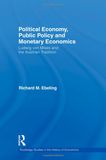 "Given the current global economic crisis, with its origins in a credit crisis, and the failure of modern macroeconomics to Provide an adequate theory for the links between the credit markets and the economy, the economics profession badly needs new insights into the role of credit and expectations in causing economic fluctuations. It could learn from the ideas and policy recommendations of those economists who lived through the Great Depression. Von Mises was one of those great economists. This book is a welcome invitation to examine the ideas of von Mises and the Austrian school on such vitally important subjects. " Jagdish Handa, McGill University"In an era # in which we are seeing increased interest in studying economic theorists from the Great Depression, Ebeling has done a great service in writing a fresh work on a figure who has been greatly neglected in recent years. Ludwig von Mises Whether merits more attention one ultimately agrees with him or not. " James E. Hartley, Mount Holyoke College
"Given the current global economic crisis, with its origins in a credit crisis, and the failure of modern macroeconomics to Provide an adequate theory for the links between the credit markets and the economy, the economics profession badly needs new insights into the role of credit and expectations in causing economic fluctuations. It could learn from the ideas and policy recommendations of those economists who lived through the Great Depression. Von Mises was one of those great economists. This book is a welcome invitation to examine the ideas of von Mises and the Austrian school on such vitally important subjects. " Jagdish Handa, McGill University"In an era # in which we are seeing increased interest in studying economic theorists from the Great Depression, Ebeling has done a great service in writing a fresh work on a figure who has been greatly neglected in recent years. Ludwig von Mises Whether merits more attention one ultimately agrees with him or not. " James E. Hartley, Mount Holyoke CollegeShould the state be abolished central banking: the shadow of the financial crisis?
 As early as 1358 a French bishop Nicolas of Oresme had recognized that artificial expansion of the money supply primarily by the monetary authorities themselves are operated. These are harmful to trade and commerce and even threatened to civilization.And in 1859 wrote Friedrich Wilhelm Raiffeisen, "He cries all the world for money, and that after cheap money as possible. The easier, the more and the cheaper this will become, the worse the condition will be. "The policy of cheap money has fatal consequences, as the current financial crisis highlights painful. If the central government crisis fight back with a low interest rate policy, the next bubble is inevitable.Andreas Hoffmann, Jörg Guido Hülsmann, A. Ekkehard Köhler, Thorsten Polleit, Frank Schaeffler, George Selgin, Norbert F. and Lawrence H. White Tofall analyze not only the role of central banks in the emergence of the financial crisis, but also point to possible solutions, such as one can go from bad to good money.
As early as 1358 a French bishop Nicolas of Oresme had recognized that artificial expansion of the money supply primarily by the monetary authorities themselves are operated. These are harmful to trade and commerce and even threatened to civilization.And in 1859 wrote Friedrich Wilhelm Raiffeisen, "He cries all the world for money, and that after cheap money as possible. The easier, the more and the cheaper this will become, the worse the condition will be. "The policy of cheap money has fatal consequences, as the current financial crisis highlights painful. If the central government crisis fight back with a low interest rate policy, the next bubble is inevitable.Andreas Hoffmann, Jörg Guido Hülsmann, A. Ekkehard Köhler, Thorsten Polleit, Frank Schaeffler, George Selgin, Norbert F. and Lawrence H. White Tofall analyze not only the role of central banks in the emergence of the financial crisis, but also point to possible solutions, such as one can go from bad to good money.Wise from damage? Causes of the financial crisis and the necessary teaching
 In 2008, the international financial system faced collapse. A slump in the U.S. housing market was the big investment banks, commercial banks and insurance companies established in the financial ruin driven. The availability of credit in the world economy came to a halt. How could this happen?The policy has only a scapegoat: the greed and irrationality of unfettered capitalism. Governments around the world in a spectacular break from activism - trillions are mobilized to nationalize banks and to support industrial companies. The central banks continue to open their gates money than ever. But without a thorough understanding of the financial crisis threatens to cause premature responses only further damage.Renowned authors take a look behind the scenes and show how destabilize a wrong policy, regulatory disincentives and poor money order to destroy the market economy and prosperity. Can be a real change in thinking is necessary so that the market again secure sustainable growth and prevent crises.Critical comments and analysis to evaluate the financial crisis, new: more market and competition are the only remedy for monetary and financial crises. It is high time from injury to make sense!With contributions from Roland Baader, Thorsten Polleit, Beat Kappeler, Pascal Salin, Michael of Prollius, Karen Horn, Taghizadegan Rahim, Daniel Kohler, Philipp Bagus and Robert Nef.
In 2008, the international financial system faced collapse. A slump in the U.S. housing market was the big investment banks, commercial banks and insurance companies established in the financial ruin driven. The availability of credit in the world economy came to a halt. How could this happen?The policy has only a scapegoat: the greed and irrationality of unfettered capitalism. Governments around the world in a spectacular break from activism - trillions are mobilized to nationalize banks and to support industrial companies. The central banks continue to open their gates money than ever. But without a thorough understanding of the financial crisis threatens to cause premature responses only further damage.Renowned authors take a look behind the scenes and show how destabilize a wrong policy, regulatory disincentives and poor money order to destroy the market economy and prosperity. Can be a real change in thinking is necessary so that the market again secure sustainable growth and prevent crises.Critical comments and analysis to evaluate the financial crisis, new: more market and competition are the only remedy for monetary and financial crises. It is high time from injury to make sense!With contributions from Roland Baader, Thorsten Polleit, Beat Kappeler, Pascal Salin, Michael of Prollius, Karen Horn, Taghizadegan Rahim, Daniel Kohler, Philipp Bagus and Robert Nef.Treatise on freedom
 Freedom is important - it is, most people agree. But what is freedom anyway? To enjoy freedom permanently, requires a clear idea of what it is and what they can do. Guarantees freedom of society "no" warm nest, she will not prescribe people how they have to be happy. However, it leads to greater prosperity and cultural richness. It protects the people from them than are other means to an end. Too often people think that one can sacrifice a little freedom for other values, only to find that in the end are lost. "You only need to see the migration of this world, to understand people's desire for freedom. Utopians, including many intellectuals, like the totalitarian communist Cuba or some other country for the "better world keep <- they want to live in most cases not even there. On the contrary: people always have millions and millions to flee before the supposed utopia towards greater freedom and real, or at least preferable to the benefits associated with it. "
Freedom is important - it is, most people agree. But what is freedom anyway? To enjoy freedom permanently, requires a clear idea of what it is and what they can do. Guarantees freedom of society "no" warm nest, she will not prescribe people how they have to be happy. However, it leads to greater prosperity and cultural richness. It protects the people from them than are other means to an end. Too often people think that one can sacrifice a little freedom for other values, only to find that in the end are lost. "You only need to see the migration of this world, to understand people's desire for freedom. Utopians, including many intellectuals, like the totalitarian communist Cuba or some other country for the "better world keep <- they want to live in most cases not even there. On the contrary: people always have millions and millions to flee before the supposed utopia towards greater freedom and real, or at least preferable to the benefits associated with it. "The Social Economy: Studies on socialism
 This book takes a systematic refutation of Mises of socialism in all its variants, where he not only economic, but will also address cultural and social aspects. The core of his argument is the already famous in his article "The economic calculation in a socialist community" set out the impossibility of economic planning in a socialist "planned economy".
This book takes a systematic refutation of Mises of socialism in all its variants, where he not only economic, but will also address cultural and social aspects. The core of his argument is the already famous in his article "The economic calculation in a socialist community" set out the impossibility of economic planning in a socialist "planned economy".The perversion of the market economy: The road back to the state economy and social market economy
 Market economy is an integral part of the culture of the West. At the same time, the market economy today, many enemies and few supporters. She is inherently social character ignored by politicians and especially misguided interventionist intellectuals. Given the failure of conventional welfare policy with growing masses of disappointed and swindled people, it's time to face the prevailing economic fraud. Not the market economy produces crises. Rather, those responsible for it are trying constantly to achieve results against the people in markets. The social market economy is no longer socially. Cause is not a lack of welfare state, but a lack of market economy. The financial crisis is not the consequence of unbridled market economy, but first and foremost an expression state economic misconduct. The irreconcilable antagonism between on-wing politics and power to the satisfaction of human needs oriented market economy, the conflict of this century, we have to face at last. The return to a social market economy has required a renewal of the market economy.Tenor of this essay is that we learn from self-interest and the truth for the sake of the poor reputation of the market economy, which is known in English speaking countries known as capitalism, should not take for granted. Market economy and social market economy are not self-sustaining systems. Rules and Regulations oblivion loss go hand in hand. Those who do not rebel against the order date shall, (soon) see that he lives under conditions that he has neither desired nor would endure.
Market economy is an integral part of the culture of the West. At the same time, the market economy today, many enemies and few supporters. She is inherently social character ignored by politicians and especially misguided interventionist intellectuals. Given the failure of conventional welfare policy with growing masses of disappointed and swindled people, it's time to face the prevailing economic fraud. Not the market economy produces crises. Rather, those responsible for it are trying constantly to achieve results against the people in markets. The social market economy is no longer socially. Cause is not a lack of welfare state, but a lack of market economy. The financial crisis is not the consequence of unbridled market economy, but first and foremost an expression state economic misconduct. The irreconcilable antagonism between on-wing politics and power to the satisfaction of human needs oriented market economy, the conflict of this century, we have to face at last. The return to a social market economy has required a renewal of the market economy.Tenor of this essay is that we learn from self-interest and the truth for the sake of the poor reputation of the market economy, which is known in English speaking countries known as capitalism, should not take for granted. Market economy and social market economy are not self-sustaining systems. Rules and Regulations oblivion loss go hand in hand. Those who do not rebel against the order date shall, (soon) see that he lives under conditions that he has neither desired nor would endure.Market economy is not enough: Collected Essays
 Whether in the Weimar Republic, in exile or in the young Federal Republic: Wilhelm Röpke (1899-1966) one of the great spiritual leaders of the Western world in the fight against the totalitarian temptations of left and right. As an economist, he ran no applied mathematics, but prudent moral science. His ideal of a civitas humana, which serves the self-determination and dignity of man, is more relevant than ever. In this volume 36 essays and essays are gathered who want to introduce new readers to the major themes of his work. But also on Röpke expert waits one or the other discovery.
Whether in the Weimar Republic, in exile or in the young Federal Republic: Wilhelm Röpke (1899-1966) one of the great spiritual leaders of the Western world in the fight against the totalitarian temptations of left and right. As an economist, he ran no applied mathematics, but prudent moral science. His ideal of a civitas humana, which serves the self-determination and dignity of man, is more relevant than ever. In this volume 36 essays and essays are gathered who want to introduce new readers to the major themes of his work. But also on Röpke expert waits one or the other discovery.From the value of better ideas: six lectures on economics and politics
 How clear and unambiguous nevertheless the Mises between basic ideas in this book emerge those ideas about the economy and society, which earned him the admiration of his followers and the hostility of his opponents, although each of the six papers can be regarded as an independent treatise, prepares the harmony of the whole series the reader an aesthetic pleasure, as he witnessed the beholder of an architectural masterpiece. (Fritz Machlup / Princeton, 1979) Freedom in society means that a person is dependent as much on others, like this from him. In a free market economy is all his fellow citizens, and these in turn serve him. People believe that in a market economy [] the captains of industry, the business people who are entrepreneurs who actually provide the tone in the economy. But that's a mistake. The real masters of the market economy are the consumers. And if consumers turn away from an industry that affected businessmen lose their importance in the overall economy, unless they adapt their activities to the needs and the mandates to the consumer.
How clear and unambiguous nevertheless the Mises between basic ideas in this book emerge those ideas about the economy and society, which earned him the admiration of his followers and the hostility of his opponents, although each of the six papers can be regarded as an independent treatise, prepares the harmony of the whole series the reader an aesthetic pleasure, as he witnessed the beholder of an architectural masterpiece. (Fritz Machlup / Princeton, 1979) Freedom in society means that a person is dependent as much on others, like this from him. In a free market economy is all his fellow citizens, and these in turn serve him. People believe that in a market economy [] the captains of industry, the business people who are entrepreneurs who actually provide the tone in the economy. But that's a mistake. The real masters of the market economy are the consumers. And if consumers turn away from an industry that affected businessmen lose their importance in the overall economy, unless they adapt their activities to the needs and the mandates to the consumer.Transformations of neoliberalism: A study on development and spread of the Mont Pelerin Society
 A specter is haunting Europe: the neo-liberalism. Neo-liberalism has degenerated into a mostly negative connotations keyword. This book aims to contribute to the objectification of the debate and illuminate the intellectual and historical roots of neoliberalism. The economic historian Philip Plickert analyzed the decline of classical liberalism and the crisis in the early 20th C. In the interwar period, four centers developed a renewed liberalism: Vienna, London, Chicago and Freiburg. In 1947, Friedrich August von Hayek, the Mont Pelerin Society (MPS) as a collection point for the scattered and marginalized neoliberals.Active members of the MPS were influential thinkers such as Hayek, Ludwig von Mises, Milton Friedman, James Buchanan, Walter Eucken, Wilhelm Röpke and Alexander Rustow and Ludwig Erhard. The book describes, based on rich source material, the difficult construction of the MPS, different strategic perspectives, the early political breakthrough in Germany, with Erhard's economic reform, the internal crisis of 1960 and the long-term impact of the MPS as an intellectual core organization of the neoliberals on science and politics.
A specter is haunting Europe: the neo-liberalism. Neo-liberalism has degenerated into a mostly negative connotations keyword. This book aims to contribute to the objectification of the debate and illuminate the intellectual and historical roots of neoliberalism. The economic historian Philip Plickert analyzed the decline of classical liberalism and the crisis in the early 20th C. In the interwar period, four centers developed a renewed liberalism: Vienna, London, Chicago and Freiburg. In 1947, Friedrich August von Hayek, the Mont Pelerin Society (MPS) as a collection point for the scattered and marginalized neoliberals.Active members of the MPS were influential thinkers such as Hayek, Ludwig von Mises, Milton Friedman, James Buchanan, Walter Eucken, Wilhelm Röpke and Alexander Rustow and Ludwig Erhard. The book describes, based on rich source material, the difficult construction of the MPS, different strategic perspectives, the early political breakthrough in Germany, with Erhard's economic reform, the internal crisis of 1960 and the long-term impact of the MPS as an intellectual core organization of the neoliberals on science and politics.Freedom of Eros: A plea for a radical Enlightenment
 Individual freedom is the greatest achievement of modernity.More than ever, is a redefinition of the relationship between political and individual freedom is necessary.This essay is about the pitfalls of freedom as well as of their potential, of their dilemma that accompanies us at least since the Enlightenment, namely, the longing for freedom that constantly wrestles with the fear of it.
Individual freedom is the greatest achievement of modernity.More than ever, is a redefinition of the relationship between political and individual freedom is necessary.This essay is about the pitfalls of freedom as well as of their potential, of their dilemma that accompanies us at least since the Enlightenment, namely, the longing for freedom that constantly wrestles with the fear of it.Anarchism / Minarchism: Is a Government Part of a Free Country?
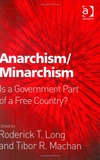 It is well known that the radical libertarian philosopher Robert Nozick sharply distinguished his vision of the free society from egalitarian liberals such as John Rawls. Less remarked upon is the distinction he drew between the free society governed by a strictly limited government, commonly Referred To As 'minarchism', and the society without any government at all - anarchism.In this volume, the editors, Long - of anarchists, and Machan - a minarchist, have brought together a selection of specially commissioned essays from the key theorists Actively involved in this debate. Each tackles the question of Whether or not a government forms a legitimate part of a free society from a variety of perspectives Whether or anarchy / minarchy is Merely a distinction without a difference.
It is well known that the radical libertarian philosopher Robert Nozick sharply distinguished his vision of the free society from egalitarian liberals such as John Rawls. Less remarked upon is the distinction he drew between the free society governed by a strictly limited government, commonly Referred To As 'minarchism', and the society without any government at all - anarchism.In this volume, the editors, Long - of anarchists, and Machan - a minarchist, have brought together a selection of specially commissioned essays from the key theorists Actively involved in this debate. Each tackles the question of Whether or not a government forms a legitimate part of a free society from a variety of perspectives Whether or anarchy / minarchy is Merely a distinction without a difference.Institutional Competition
 Why is competition between institutions usually viewed in a negative light, when competition is considered positive in most other economic contexts? The contributors to this volume introduce new perspectives on this issue, analytically and empirically exploring reasons for this perception.Negative assessments of institutional competition emphasize that such competition may lead to a race to the bottom in terms of eroding government revenues, redistributing wealth from workers to capitalists, and limiting democracy by forcing politicians to prioritize international investment capital rather than working for their voters. In this volume, however, many of the essays draw attention to the positive learning effects and information. The contributors conclude that competition may actually lead to becoming more efficient institutions in allocating resources.Contents:ForewordPreface
Why is competition between institutions usually viewed in a negative light, when competition is considered positive in most other economic contexts? The contributors to this volume introduce new perspectives on this issue, analytically and empirically exploring reasons for this perception.Negative assessments of institutional competition emphasize that such competition may lead to a race to the bottom in terms of eroding government revenues, redistributing wealth from workers to capitalists, and limiting democracy by forcing politicians to prioritize international investment capital rather than working for their voters. In this volume, however, many of the essays draw attention to the positive learning effects and information. The contributors conclude that competition may actually lead to becoming more efficient institutions in allocating resources.Contents:ForewordPreface
Andreas Bergh and Rolf HöijerFirst The Concept of Institutional Competition
Rolf HöijerSecond A History of Thought on Institutional Competition
Roland VaubelThird Learning Through Institutional Competition
Michael Wohlgemuth4th Institutional Competition: International Environment, Levels and Consequences
Peter Bernholz5th Can Competition Between Governments Enhance Democracy?
Viktor J. Vanberg6th Tax Competition and Tax Cartels
Rolf Höijer7th Fiscal Competition and the Optimization of Tax Revenues for Higher Growth
Victoria Curzon-Price8th A Race to the Bottom for the Big Welfare States?
Andreas Bergh9th Fiscal Federalism and Economic Growth in OECD Countries
Lars P. Feld10th Asia's Giants in the World Economy: China and India
, Erich WeedeIndexThe Ethics of Money Production
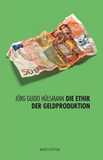 Our modern monetary systems were created to combat crises and to ensure prosperity. But the financial markets ever break again, there exists constant alarm. Is there a bug in the system? We are not accustomed to consider the production of money as an industry like any other, but Jörg Guido Hülsmann shows that they can be examined by the usual means of economics and rational ethics. He describes the social, cultural and spiritual consequences of permanent inflation and explains the functioning of national and international monetary systems. Hülsmann argues, inter alia, on the basis of Christian moral teaching that the present forms of money creation are economically and ethically questionable. Our monetary system produces inequitable income, wealth destroyed, shattered the moral foundations of society and eventually leads to hyperinflation, or totalitarianism. JG Hülsmann is a professor of economics at the University of Angers, France, and Senior Fellow at the Mises Institute in Auburn (Alabama, USA). He has written numerous works on monetary theory and policy published.
Our modern monetary systems were created to combat crises and to ensure prosperity. But the financial markets ever break again, there exists constant alarm. Is there a bug in the system? We are not accustomed to consider the production of money as an industry like any other, but Jörg Guido Hülsmann shows that they can be examined by the usual means of economics and rational ethics. He describes the social, cultural and spiritual consequences of permanent inflation and explains the functioning of national and international monetary systems. Hülsmann argues, inter alia, on the basis of Christian moral teaching that the present forms of money creation are economically and ethically questionable. Our monetary system produces inequitable income, wealth destroyed, shattered the moral foundations of society and eventually leads to hyperinflation, or totalitarianism. JG Hülsmann is a professor of economics at the University of Angers, France, and Senior Fellow at the Mises Institute in Auburn (Alabama, USA). He has written numerous works on monetary theory and policy published.The control theories of Austrian Economics
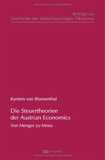
The Ethics of Liberty
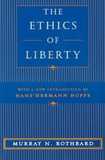 This work is a rigorous and Philosophically sophisticated exposition of the libertarian political position. It roots the case for freedom in the concept of natural rights and Applies it to a host of practical problems. It concludes that a social order that strictly adheres to the rights of private state property must exclude the institutionalized violence inherent in the.
This work is a rigorous and Philosophically sophisticated exposition of the libertarian political position. It roots the case for freedom in the concept of natural rights and Applies it to a host of practical problems. It concludes that a social order that strictly adheres to the rights of private state property must exclude the institutionalized violence inherent in the.Capitalism: The Unknown Ideal
 The foundations of capitalism are being battered by a flood of altruism, which is the cause of the modern world's collapse.This is the view of Ayn Rand, a viewer so radically opposed to prevailing attitudes that it constitutes a major philosophic revolution. In this series of essays, she presents her stand on the persecution of big business, the causes of war, the student rebellion, and the evils of altruism.
The foundations of capitalism are being battered by a flood of altruism, which is the cause of the modern world's collapse.This is the view of Ayn Rand, a viewer so radically opposed to prevailing attitudes that it constitutes a major philosophic revolution. In this series of essays, she presents her stand on the persecution of big business, the causes of war, the student rebellion, and the evils of altruism.The state - the great fiction

The dimension of the human
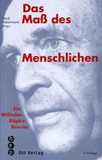
How liberal can be the state? An anarcho-capitalist perspective of liberalism

Small book reading on liberalism
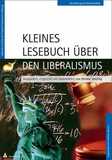
Small reading book on federalism

Capitalism and Freedom
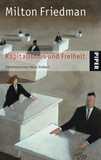 Appeared as the band's "Capitalism and Freedom" in 1962 in the USA, the Western economic policy dealing with planning and intervention. Friedman, who on 31 July's 90th Celebrates birthday, criticized this policy at an early stage, "the lack of belief in freedom." In the 80 years the ideas of U.S. economists were popular. Today, as state reform preventer and regulators set the tone, Friedman's work was published after many years finally back in German. A creed smart, single, provocative. A great book.
Appeared as the band's "Capitalism and Freedom" in 1962 in the USA, the Western economic policy dealing with planning and intervention. Friedman, who on 31 July's 90th Celebrates birthday, criticized this policy at an early stage, "the lack of belief in freedom." In the 80 years the ideas of U.S. economists were popular. Today, as state reform preventer and regulators set the tone, Friedman's work was published after many years finally back in German. A creed smart, single, provocative. A great book.Poet of Freedom. A Friedrich Schiller Breviary

Freedom or equality. Alexis de Tocqueville, a breviary

Logic of freedom. A Ludwig von Mises Breviary
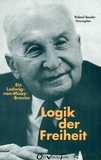
The path to prosperity. A Adam Smith Breviary

Correct position. A polemical social lexicon
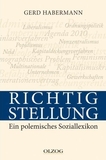 The German politically correct Newspeak is full of euphemisms and obvious prevarication is this abound examples: freedom as absence of restraint is the positive freedom in the sense of social security or care, justice is social justice in terms of social leveling, claims are on social rights, social partnership represents the most powerful cartel of German history and the pension insurance has absolutely nothing to do with insurance. Spicy, not least, the euphemism is generational contract: the contract term because it leads to absurdity, because children and unborn children can not even known to be no contract will be closed. This socially polemical lexicon with over 300 entries, cross-referencing a variety of references and link with bibliographical appendix does not even claim raises objective in the sense of being value-free, it sees itself rather as an invitation for a return of the state to an unavoidable minimum to enter and sees itself mainly as an anti-bureaucratic lexicon. Read in context, it represents nothing less than an introduction to the school of liberal thought dar.
The German politically correct Newspeak is full of euphemisms and obvious prevarication is this abound examples: freedom as absence of restraint is the positive freedom in the sense of social security or care, justice is social justice in terms of social leveling, claims are on social rights, social partnership represents the most powerful cartel of German history and the pension insurance has absolutely nothing to do with insurance. Spicy, not least, the euphemism is generational contract: the contract term because it leads to absurdity, because children and unborn children can not even known to be no contract will be closed. This socially polemical lexicon with over 300 entries, cross-referencing a variety of references and link with bibliographical appendix does not even claim raises objective in the sense of being value-free, it sees itself rather as an invitation for a return of the state to an unavoidable minimum to enter and sees itself mainly as an anti-bureaucratic lexicon. Read in context, it represents nothing less than an introduction to the school of liberal thought dar.The bureaucracy

Human Action: A Treatise on Economics
 Mises attributes the tremendous technological progress and the increase consistently in wealth and general welfare in the last two centuries to the introduction of liberal government policies based on free-market economic teachings, creating in economic and political environment Which permits individuals to pursue their respective goals in freedom and peace. Mises also explains the futility and counter-productiveness of government attempts to regulate, control, and equalize all people's circumstances: "Men are born unequal And. .. it is precisely their inequality that generates social cooperation and civilization."
Mises attributes the tremendous technological progress and the increase consistently in wealth and general welfare in the last two centuries to the introduction of liberal government policies based on free-market economic teachings, creating in economic and political environment Which permits individuals to pursue their respective goals in freedom and peace. Mises also explains the futility and counter-productiveness of government attempts to regulate, control, and equalize all people's circumstances: "Men are born unequal And. .. it is precisely their inequality that generates social cooperation and civilization."Envy Economy
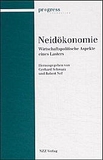 The anthology "economics envy" explores the importance of envy in the economy and economic policy. Although the book is neither a true economic theory of envy yet developed, the question of whether envy or rather brings forward the progress impeded, can answer definitively, but it highlights the various aspects of this vice from a sociological, economic and philosophical view.
The anthology "economics envy" explores the importance of envy in the economy and economic policy. Although the book is neither a true economic theory of envy yet developed, the question of whether envy or rather brings forward the progress impeded, can answer definitively, but it highlights the various aspects of this vice from a sociological, economic and philosophical view.Ludwig von Mises: The Man and His Economics
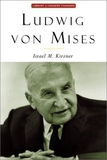 Austrian-born economist Ludwig von Mises (who died in 1973) was a professor at New York University for nearly 25 years, until The 1969th A free-market advocate who believed in the power of the consumer, Mises was one of the leading members of what is called "the Austrian school of economics." There are already any number of scholarly works that examine Mises's life and his theories. This latest book, though, is part of a new series called Library of Modern Thinkers, Which is designed to make the ideas of less well known sociologists, political scientists, economists and accessible to a more general audience. Kirzner, author of Discovery, Capitalism, and Distributive Justice (1989), was an ardent admirer and student of Mises. He sketches a brief biographical portrait of his former professor to provide 'the human and historical context within Which Mises's intellectual contributions emerge. " Kirzner then examines Mises's impact on contemporary economics, outlines his methodology, and summarize his key ideas - focusing on the market process, money, cycles, interest, and free markets.
Austrian-born economist Ludwig von Mises (who died in 1973) was a professor at New York University for nearly 25 years, until The 1969th A free-market advocate who believed in the power of the consumer, Mises was one of the leading members of what is called "the Austrian school of economics." There are already any number of scholarly works that examine Mises's life and his theories. This latest book, though, is part of a new series called Library of Modern Thinkers, Which is designed to make the ideas of less well known sociologists, political scientists, economists and accessible to a more general audience. Kirzner, author of Discovery, Capitalism, and Distributive Justice (1989), was an ardent admirer and student of Mises. He sketches a brief biographical portrait of his former professor to provide 'the human and historical context within Which Mises's intellectual contributions emerge. " Kirzner then examines Mises's impact on contemporary economics, outlines his methodology, and summarize his key ideas - focusing on the market process, money, cycles, interest, and free markets.Theory of money and working capital
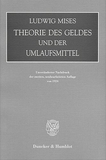 "No one knows better than we economists what our science is lacking, and no one feels their gaps and shortcomings more painful than we do. But what the policy of the last decade has required of theoretical insight, she could have learned of the national economy." (From the preface to the second edition, 1924) regarding the ideas of Ludwig von Mises, institutional arrangements and monetary policy measures have also in the early 21st Century has lost none of its topicality. His groundbreaking at the time and still worth reading for the main work money and economic policy of 1912 is now in an unchanged reprint of the revised second edition in front of 1924.
"No one knows better than we economists what our science is lacking, and no one feels their gaps and shortcomings more painful than we do. But what the policy of the last decade has required of theoretical insight, she could have learned of the national economy." (From the preface to the second edition, 1924) regarding the ideas of Ludwig von Mises, institutional arrangements and monetary policy measures have also in the early 21st Century has lost none of its topicality. His groundbreaking at the time and still worth reading for the main work money and economic policy of 1912 is now in an unchanged reprint of the revised second edition in front of 1924.The idea of freedom
 Which books to read, if one is interested in the idea of freedom? What contribution to its formulation and deepen some thinkers as Aristotle, Confucius, Mises, Ortega y Gasset, Röpke or Schumpeter done? The Library of Freedom presented by Lord Acton to Mary Wollstonecraft 111 works by some 100 authors and places it in the context of a free society and market economy. Complements the discussion of works by some of the original citations. The selection does not purport to list all the major classics of freedom, although she was thoughtful and serious, but also has a playful side sometimes. As much as the texts represent in themselves an interesting read, they should do especially desire to delve into the individual works on. The idea of the books is done by professors and journalists, has long been dealing with the idea of freedom.Browse the library of liberal thinkers.
Which books to read, if one is interested in the idea of freedom? What contribution to its formulation and deepen some thinkers as Aristotle, Confucius, Mises, Ortega y Gasset, Röpke or Schumpeter done? The Library of Freedom presented by Lord Acton to Mary Wollstonecraft 111 works by some 100 authors and places it in the context of a free society and market economy. Complements the discussion of works by some of the original citations. The selection does not purport to list all the major classics of freedom, although she was thoughtful and serious, but also has a playful side sometimes. As much as the texts represent in themselves an interesting read, they should do especially desire to delve into the individual works on. The idea of the books is done by professors and journalists, has long been dealing with the idea of freedom.Browse the library of liberal thinkers.The Road to Serfdom
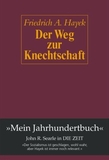 As one of the most important books of our (then) generation Henry Hazlitt has described in his review of 'The Road to Serfdom' in The New York Times bestseller Friedrich August von Hayek. That was 1945. There was a time of intellectual hesitation, the search for the right economic and socio-political model for the countries devastated by war, the victorious as well as the inferior. The pugnacious book, with its general tendency to Hayek's rival John Maynard Keynes was 'deeply moved in line', made Hayek famous overnight.Has done the best seller of his duty once he has nothing more to say to us today? Amazingly - and this is one of his qualities - has 'The Road to Serfdom' today lost none of its validity and its importance. What is Joseph Schumpeter's book once attested, namely courage and 'openness, scorned concealment and never mince his mouth', is no less important today than it was almost sixty years, on the contrary: In the atmosphere of the spiritual and the aligning state and socially enforced 'political correctness' and Hayek's relentless but realistic analysis of economic and socio-political context is of particular importance. The cult book of the renowned economist and intellectual opponent of John Maynard Keynes, whose appearance date in 2004 for the 60th Anniversary time.
As one of the most important books of our (then) generation Henry Hazlitt has described in his review of 'The Road to Serfdom' in The New York Times bestseller Friedrich August von Hayek. That was 1945. There was a time of intellectual hesitation, the search for the right economic and socio-political model for the countries devastated by war, the victorious as well as the inferior. The pugnacious book, with its general tendency to Hayek's rival John Maynard Keynes was 'deeply moved in line', made Hayek famous overnight.Has done the best seller of his duty once he has nothing more to say to us today? Amazingly - and this is one of his qualities - has 'The Road to Serfdom' today lost none of its validity and its importance. What is Joseph Schumpeter's book once attested, namely courage and 'openness, scorned concealment and never mince his mouth', is no less important today than it was almost sixty years, on the contrary: In the atmosphere of the spiritual and the aligning state and socially enforced 'political correctness' and Hayek's relentless but realistic analysis of economic and socio-political context is of particular importance. The cult book of the renowned economist and intellectual opponent of John Maynard Keynes, whose appearance date in 2004 for the 60th Anniversary time.
Right
State Opera Switzerland: a few stars, many Staatisten
 The Swiss Federal Parliament had to be renovated, cost 100 million francs. Question: Is it unreasonable to the paying public? Or even: what is happening under the gilded dome has something to do with the people with democracy do? The Federal Council commissioned Professor Valerie T. with a legal opinion that came to the conclusion in the federal budget would be no real democracy, Switzerland is less a statesman than one State Opera with a few stars on the Berne Opera House and some eight million Staatisten throughout country who believe that the listed units were reality. The report will cost the lives of Valerie T.. Parts arrive at Zurich law professor David Dürr and two journalists (from the feature pages and out of politics), try the restore. What is truth, what is fiction?
The Swiss Federal Parliament had to be renovated, cost 100 million francs. Question: Is it unreasonable to the paying public? Or even: what is happening under the gilded dome has something to do with the people with democracy do? The Federal Council commissioned Professor Valerie T. with a legal opinion that came to the conclusion in the federal budget would be no real democracy, Switzerland is less a statesman than one State Opera with a few stars on the Berne Opera House and some eight million Staatisten throughout country who believe that the listed units were reality. The report will cost the lives of Valerie T.. Parts arrive at Zurich law professor David Dürr and two journalists (from the feature pages and out of politics), try the restore. What is truth, what is fiction?The Constitution of Liberty
 "The great polymath European tradition, Nobel Laureate in Economics in 1974, has in his life work, based on a deep knowledge of many disciplines (economics, law, history, biology and psychology), followed with perseverance the idea that only individual freedom, the preservation and may ensure further development of civilization. He is more than a stumbling block has been laid to the zeitgeist. "
"The great polymath European tradition, Nobel Laureate in Economics in 1974, has in his life work, based on a deep knowledge of many disciplines (economics, law, history, biology and psychology), followed with perseverance the idea that only individual freedom, the preservation and may ensure further development of civilization. He is more than a stumbling block has been laid to the zeitgeist. "
Wilhelm Seuss, Frankfurter Allgemeine Zeitung of 8 May 1989Small reading book on the constitution of liberty
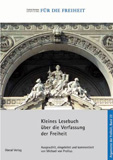
Simple Rules for a Complex World
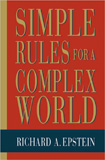 It is often considered that too many laws is one of The Necessary Consequences of a complex society. Many insist that any call for legal simplification smacks of nostalgia and sentimentality. Richard Epstein believes, however, that the conventional view has it backward. The richer texture of modern American society Allows for more individual freedom and choice, permitting the organization of a comprehensive legal order capable of meeting the technological and social challenges of today on the basis of just six core principles.The first four rules, Which regulate human interactions in ordinary social life, concern the autonomy of the individual, property, tort and contract. Taken together these rules Establish and protect consistent entitlements over all resources, both human and natural. These rules are backstopped by two more rules that permit forced exchanges on payment of just compensation when private or public necessity dictates Sun. Epstein then uses these six building blocks to clarify several intractable problems in the modern legal landscape. His discussion of employment contracts explains the hidden virtues of contracts at will and exposes the weaknesses of laws regarding collective bargaining, unjust dismissal, employer discrimination and comparable worth. Epstein's analysis shows how laws governing liability for products and professional services, corporate transactions and environmental protection have generated unnecessary social strife and economic dislocation by violating these basic principles. This text offers on agenda for social reform that undoes many of the problems of the modern regulatory state. At a time when most Americans have come to distrust and fear government at all levels, Epstein shows how a consistent application of economic and political theory Allows U.S. to steer a middle path between too much and too little.
It is often considered that too many laws is one of The Necessary Consequences of a complex society. Many insist that any call for legal simplification smacks of nostalgia and sentimentality. Richard Epstein believes, however, that the conventional view has it backward. The richer texture of modern American society Allows for more individual freedom and choice, permitting the organization of a comprehensive legal order capable of meeting the technological and social challenges of today on the basis of just six core principles.The first four rules, Which regulate human interactions in ordinary social life, concern the autonomy of the individual, property, tort and contract. Taken together these rules Establish and protect consistent entitlements over all resources, both human and natural. These rules are backstopped by two more rules that permit forced exchanges on payment of just compensation when private or public necessity dictates Sun. Epstein then uses these six building blocks to clarify several intractable problems in the modern legal landscape. His discussion of employment contracts explains the hidden virtues of contracts at will and exposes the weaknesses of laws regarding collective bargaining, unjust dismissal, employer discrimination and comparable worth. Epstein's analysis shows how laws governing liability for products and professional services, corporate transactions and environmental protection have generated unnecessary social strife and economic dislocation by violating these basic principles. This text offers on agenda for social reform that undoes many of the problems of the modern regulatory state. At a time when most Americans have come to distrust and fear government at all levels, Epstein shows how a consistent application of economic and political theory Allows U.S. to steer a middle path between too much and too little.
Development
The Beautiful Tree: A Personal Journey Into How the World's Poorest People Are Educating Themselves
 Everyone from Bono to the United Nations is looking for a miracle to bring schooling within reach of the poor children on Earth. The author found one hiding in plain sight. While researching private schools in India for the World Bank, and worried he was doing little to help the poor, he wandered into the slums of Hyderabad's Old City.
Everyone from Bono to the United Nations is looking for a miracle to bring schooling within reach of the poor children on Earth. The author found one hiding in plain sight. While researching private schools in India for the World Bank, and worried he was doing little to help the poor, he wandered into the slums of Hyderabad's Old City.From Subsistence to Exchange and Other Essays
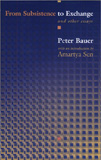 "For half a century, Peter Bauer has been a towering iconoclast among development economists, consistently unafraid to demolish conventional wisdom with penetrating insight ... [T] his excellent collection of essays ... [is] a wonderful introduction to a mind that takes no prisoners -.. The Economist Whether or not the reader agrees with [Bauer's] positions, they are carefully and thoughtfully Argued " Foreign Affairs "[Bauer] has also been interested in explaining the Zeitgeist Which produced-and in many cases continues to project-the influential ideas and policies are Which scene in such total disregard of readily observable reality. It is these reflections, contained in a number of essays in this book, Which are likely to resonate with the general reader observing the contemporary world. " Deepak Lal, Times Literary Supplement
"For half a century, Peter Bauer has been a towering iconoclast among development economists, consistently unafraid to demolish conventional wisdom with penetrating insight ... [T] his excellent collection of essays ... [is] a wonderful introduction to a mind that takes no prisoners -.. The Economist Whether or not the reader agrees with [Bauer's] positions, they are carefully and thoughtfully Argued " Foreign Affairs "[Bauer] has also been interested in explaining the Zeitgeist Which produced-and in many cases continues to project-the influential ideas and policies are Which scene in such total disregard of readily observable reality. It is these reflections, contained in a number of essays in this book, Which are likely to resonate with the general reader observing the contemporary world. " Deepak Lal, Times Literary Supplement
The White Man's Burden: Why the West's Efforts to Aid the Rest Have Done So Much Ill and So Little Good

Africa Unchained: The Blueprint for Africa's Future
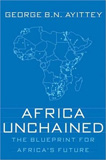
Anthony de Jasay
Liberal rationality, social confusion
 Anthony de Jasay belongs to that group of great scholars who quote themselves are hardly ever. His thoughts and ideas are always so inventive, stirring and sharply cut gems. In addition to previously unpublished essays in this volume for the first time ever, all his published essays on German combined. De Jasay's compelling arguments and his masterful art formulation convince themselves dissenters. The overarching themes of his work is in accordance with the book in politics, philosophy and socialism divided.
Anthony de Jasay belongs to that group of great scholars who quote themselves are hardly ever. His thoughts and ideas are always so inventive, stirring and sharply cut gems. In addition to previously unpublished essays in this volume for the first time ever, all his published essays on German combined. De Jasay's compelling arguments and his masterful art formulation convince themselves dissenters. The overarching themes of his work is in accordance with the book in politics, philosophy and socialism divided.The State
 An analysis of modern political arrangements that views the state as acting in its own interest contrary to the interests of individuals and even of an entire society. The text traces the logical and historical progression of the state from a modest-sized protector of life and property through its development into what the author believe to be an "agile seducer of democratic majorities" and "the welfare-dispensing drudge that it is today ".
An analysis of modern political arrangements that views the state as acting in its own interest contrary to the interests of individuals and even of an entire society. The text traces the logical and historical progression of the state from a modest-sized protector of life and property through its development into what the author believe to be an "agile seducer of democratic majorities" and "the welfare-dispensing drudge that it is today ".Ordered Anarchy: Jasay and His Surroundings
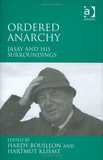 Anthony de Jasay's work has been enormously influential, describing both a theoretical philosophical model for a stateless, liberal, free market order and offering analysis of and solutions to many of the technical economic problems associated with such a vision of society - most notably his work on the free rider and his return. In this book, ten significant scholars in philosophy and political economy, including Nobel laureate in economics James Buchanan, pay tribute to the man and his work in a series of essays at once both respectful and critical. "Ordered Anarchy" focuses on three fundamental questions of libertarian thinking. Which are the basic libertarian principles and rights and liberties how do relate to each other? Is possible and durable in order to anarchic or quasi-anarchic society, and if so, under Which preconditions? How and to what extent are the pillars of politics, such as the constitution, institutions and government, detrimental or beneficial to society of enduring free? While Narveson, Palmer and bouillon focus on the first of these questions, the late Radnitzky and van Dun address the second.Benson, Holcombe and Kliemt Provide answers to question number three, while Buchanan and highlight the role of Little Anthony de Jasay in this debate and the inspiration that his thinking has given to the authors of this volume.
Anthony de Jasay's work has been enormously influential, describing both a theoretical philosophical model for a stateless, liberal, free market order and offering analysis of and solutions to many of the technical economic problems associated with such a vision of society - most notably his work on the free rider and his return. In this book, ten significant scholars in philosophy and political economy, including Nobel laureate in economics James Buchanan, pay tribute to the man and his work in a series of essays at once both respectful and critical. "Ordered Anarchy" focuses on three fundamental questions of libertarian thinking. Which are the basic libertarian principles and rights and liberties how do relate to each other? Is possible and durable in order to anarchic or quasi-anarchic society, and if so, under Which preconditions? How and to what extent are the pillars of politics, such as the constitution, institutions and government, detrimental or beneficial to society of enduring free? While Narveson, Palmer and bouillon focus on the first of these questions, the late Radnitzky and van Dun address the second.Benson, Holcombe and Kliemt Provide answers to question number three, while Buchanan and highlight the role of Little Anthony de Jasay in this debate and the inspiration that his thinking has given to the authors of this volume.Against Politics
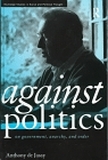 Government depends on collective decision making. Even in peaceful democracies, some decide for ave Challenging the morality of this position, this text argues that it is not different political systems that are at fault so much as the very nature of politics itself. This text pulls together key de Jasay's work in this area over the last ten years. In the first section of the book de Jasay attacks contract arian thought and the very notion of the legitimacy of politics. In the final section he outlines an alternative vision, a form of ordered anarchy based on social virtues, achievements and institutions exist prior to government and Which Which are not contingent on political arrangements. The book provides insight into to a radical form of libertarianism Which renders even the most minimal form of state redundant.
Government depends on collective decision making. Even in peaceful democracies, some decide for ave Challenging the morality of this position, this text argues that it is not different political systems that are at fault so much as the very nature of politics itself. This text pulls together key de Jasay's work in this area over the last ten years. In the first section of the book de Jasay attacks contract arian thought and the very notion of the legitimacy of politics. In the final section he outlines an alternative vision, a form of ordered anarchy based on social virtues, achievements and institutions exist prior to government and Which Which are not contingent on political arrangements. The book provides insight into to a radical form of libertarianism Which renders even the most minimal form of state redundant.

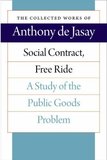
No comments:
Post a Comment